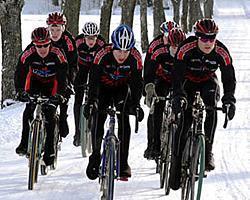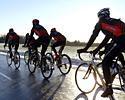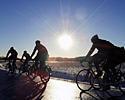
Recently on Cyclingnews.com |
Tales from the peloton, May 24, 2004
Team Mälarenergi: A clean slate - Part I

|
Over the years, Swedish amateur team Team Mälarenergi has guided riders like Michael Andersson, Martin Rittsel and Marcus Ljungqvist to professional contracts. But after a second-rate 2003, decided to wipe the slate clean and start all over again.
In part one of this feature, Team Manager Patrick Serra speaks to Cyclingnews' Swedish correspondent Gabriella Ekström about the Mälarenergi way, lessons in how to live far away from home, and how to pick the raisins from the bread.
"Last year was a very mediocre year for us," says Serra. "We approached a few things the wrong way, so this season, I decided to start all over with a new fresh team. Our main sponsor Mälarenergi trusted us with a new three-year contract, so I went out searching for a line-up of young riders." However, before contracting any espoirs for his team, Serra sought a new manager, who wasn't very old either.
"David Johansson is just 25 himself, and only gave up his own sporting career a few years ago. After he stopped cycling he worked for Västerås CK, which is a local club in the same city where Team Mälarenergi is based. I took notice of him two years ago. He was quite fresh obviously, but he kept asking fairly intelligent questions at the team leader meetings, so I recommended him to the Swedish cycling federation, and they sent him to Holland to coach the women's national team. In all, he has gained some good experiences, and this year, he'll work for us."
The group of riders that will benefit from the well laid-out plan of Team Mälarenergi is a group of eight riders, not one older than 23. Ex-pro Fredrik Modin who spent last season with Team Fakta will ride with the team in Spain during the spring, before turning his attention to the Olympics, where he hopes to be Sweden's only mountain bike Olympian. After successful debuts as juniors, brothers Dennis and Lucas Persson rode for Danish team CK Kronoborg for one year before joining Mälarenergi in the hope of further development.
"Our riders are in a very vulnerable period of their lives. They are all new here and some have increased their workload by 100 percent."- Team Manager Patrick Serra explains the importance of eating correctly, which includes cooking classes for the riders |
With three years studying in Florence and one year in Paris, Rickard Almquist adds some international flavour to the group. He is recently back from surgery, but has already made a name for himself because of his appreciation of great Russian writers and classical music. Other colourful additions to the group are Rikard Sjöberg, the younger brother of ex-Collstrop pro Daniel Sjöberg, and Martin Nyman, who has an interesting background as a zoo keeper, with elephants his speciality. The team is completed with Martin Halvarsson, who just completed his three years at the cycling high school in Skara, and Andreas Johansson, who started his career as a mountain biker together with Fredrik Modin.
Speaking to Serra about his offsider David Johansson, he seems brave to hire someone without international experience, to coach riders who also lack experience in most fields. "Yes, it is true, but I saw my chance to bring David's fresh mind into my team, and since I'm re-building the team this year, I thought the timing was perfect," says Serra.
"There's no need for me to reprogram him, because he is brand new without a lot of traditions and ideas about how things should be done. He is aware that he doesn't know it all, but he wants to get engaged, and I'm sure he will. He can look at his leadership from a 2004 point of view, and by sending him to all the seminaries and leadership classes I can find, I trust he will develop. I'd like to see some Swedish leadership, not necessarily ā la Patrick Serra, more like Sven-Göran Eriksson, although I'll send some of my continental thoughts of leadership and organisation with him as well."
|
|
|
Is it possible that his young age could lead to some disrespect from the riders if they start to see him as more of an equal mate than a leader? "No, no. He might be young, but they're even younger. I have no fear of that, although I suspect he might get into some trouble with some race leaders or other directeur sportifs. The way I see it, he's a coach who can be at their side all day long. During the day, but also after training or racing is over. Like right now, we have the cooking classes, and Spanish lessons for the riders and their girlfriends, and David fits right in."
Yes, Spanish. With a Spanish father and a Swedish mother, Avignon-born Serra brings all his riders to Spain, where they often compete with success, and it comes naturally that all the riders should learn at least some Spanish. "What does cubierta mean?" someone shouts across the two storey building that is the Swedish base for the team.
"Tire!" answers Serra before he explains the importance of languages and communication. "I don't teach them any bad words, I figure they will catch up with that pretty fast anyway. These classes are specially designed for them, adapted for the coming life of a cyclist. It's a very social thing to know a little of the language when you come to a country. First of all it's good if you can socialise a bit and make yourself understood in the peloton, but it also makes wonders in your everyday life. It is so much easier to adapt yourself to the lifestyle in a new country if you know how to ask the time or how to buy a sandwich."
The other class the riders have to go through is perhaps a bit abnormal for a group of guys in their late teens.
"Well, with a wife who's a nutritionist, it comes naturally to me. We have looked at the diet advice given by the SOK (Swedish Olympic Committee), but we don't think they are adapted to cyclists," Serra explains about the need for cooking classes.
"Our riders are in a very vulnerable period of their lives. They do need to lose weight, but they are also in a phase were they are growing a lot, so it is of utmost importance that they eat correct food. They are all new here and some have increased their workload by 100 percent. Marie, who is a ex-rider herself, has put in a enormous amount of time constructing different dietary plans for all the riders, depending on what type of training they are currently doing. One diet for power workout, another for fat-burning training. It is also important that the ideas and recipes can be translated into reality, that the rider can buy and cook something on Monday, and use some of that for Tuesday still. It is very important that they never go hungry."
Click here for Part II: Selection isn't easy


